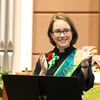 When you're planning an intergenerational Sunday school experience, as with any faith formation experience, it's essential to consider multiple learning styles. Some of us learn better visually, with images or videos; others learn by hearing; and still others learn best by doing. The research on this topic including Dr. Howard Gardner’s theory of multiple intelligences is out there, and it is rich! You can find hundreds of articles online about multiple learning styles (I'll let you search yourself if you're unfamiliar with the concept). This idea is not at all new, and you won't have to look far to find more information on how best to meet the needs of different learners.
When you're planning an intergenerational Sunday school experience, as with any faith formation experience, it's essential to consider multiple learning styles. Some of us learn better visually, with images or videos; others learn by hearing; and still others learn best by doing. The research on this topic including Dr. Howard Gardner’s theory of multiple intelligences is out there, and it is rich! You can find hundreds of articles online about multiple learning styles (I'll let you search yourself if you're unfamiliar with the concept). This idea is not at all new, and you won't have to look far to find more information on how best to meet the needs of different learners.
Learning styles are now considered throughout most kids' and youth curriculum. But here's the thing: learning styles aren't unique to kids. Believe it or not, turning 18 doesn't change how you learn best, and it doesn't suddenly transform your attention span or preferred presentation style.
Yes, consider all learning styles in planning your intergenerational Sunday School experience and then take it a step further. Often, we see the need to engage different learning styles as a challenge. Practically, it is. But when we think about an intergenerational Sunday school class, it's more than a challenge: it's a gift.
Check out my previous Sparkhouse blog post on the idea that generations are cultures, and that the way we plan for cross-generational experiences must take into account the differences each generation brings to the table. But when it comes to learning styles, generational lines don't matter.
All learning styles are found in each generation; the difference is, as we grow and develop as adults, we develop adaptations and compensations that help us operate within the contexts in which we're operating. We aren't often allowed to learn or engage in the way that is most natural for us.
By considering learning styles in intergenerational Sunday school, you're giving your participants the opportunity to lean in to the learning style that is most natural for them, even if they've learned to operate another way in their daily life. Especially for adults, this can be a transformational experience. I used to get laughter and eye rolls when I would offer adults coloring pages and crayons; now adult coloring books are flying off the shelves, because we have allowed individuals not to be limited in their learning or engagement style based on their age or stage in life.
In addition, you can create connections between generations not just based on interest, theology, or hobbies, but also through those learning styles. Adults and kids alike can help each other discover a learning style they may never have been aware of!
While engaging different learning styles does require greater preparation for an intergenerational Sunday school class, it's also a gift to the generations, and to your church!
Get more insight into the best practices for hosting an intergenerational Sunday school in Melissa’s series!



